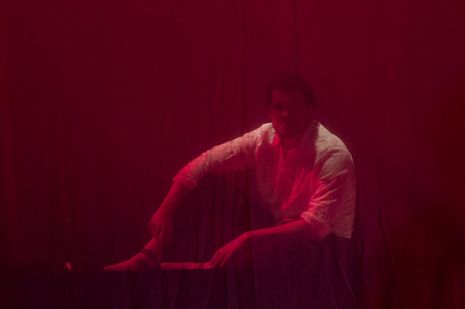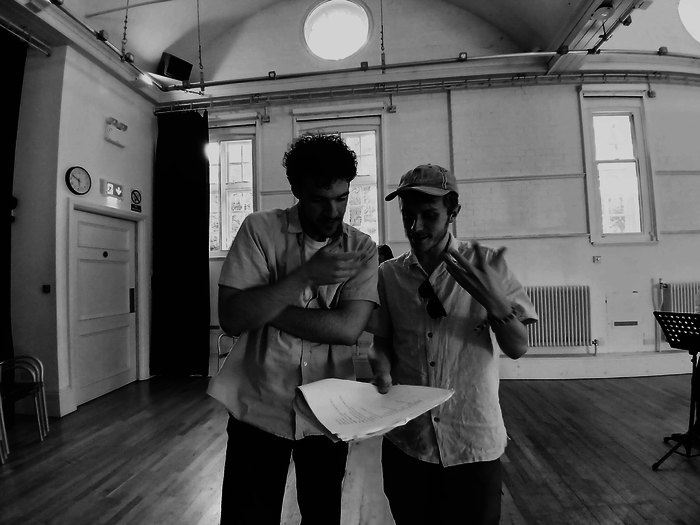MESSIAH: a gaze at the irony of modern politics
Elena Brown Moreno is strongly compelled by this exploration of contemporary politics

The ADC’s latest political satire, MESSIAH, is a striking and timely production centred on the rise and fall of a maverick left-wing politician, Stu Bailey (played by Jacob Benhayoun). It’s smart, bitingly funny, and emotionally astute, echoing real-life political drama while crafting a compelling fictional narrative of its own.
Written by Aisling Towl, what makes this play particularly resonant is how well the subject matter suits the stage. The play understands that politics is, at its core, theatre. Both are steeped in tradition, presentation, and performance, designed to win over audiences, whether in the stalls or at the ballot box. Stu, despite his supposed authenticity, is performing just as much as anyone else, crafting the image of the down-to-earth, razor-sharp outsider who simply sees things clearly. It’s a persona as carefully constructed as any stage character, and the play doesn’t let us forget it. This layered awareness makes MESSIAH not just a compelling political drama, but a bold commentary on how power is performed, packaged, and sold.
“The play understands that politics is, at its core, theatre”
Stu, a charismatic politician armed with a bold socialist message of championing people over profit, rises swiftly in public favour - finding himself subject to increasing scrutiny as he moves from opposition leader to serious contender for Prime Minister. Enter Sophie White (Idara James), the newest member of his campaign team, whose personal and professional journey forms a key part of the show’s emotional through-line.
Where the play slightly stumbles is its pacing. The first act focusses heavily on building Stu up: his politics, his ideals and his public support all take centre stage. Despite some heavy-handed foreshadowing the scandal itself arrives too late in the narrative to fully land. Though clearly influenced by real political horrors, with echoes of Epstein and tabloid betrayal, the delayed timing results in the fallout feeling rushed. Consequently, as previously mentioned, the emotional impact, especially for Sophie, lacks the depth it deserves. There’s a missed opportunity to explore her internal conflict: working with someone she believed in, only to face their human flaws.
“The audience is left with the bitter taste of déjà vu”
The ending is devastating in its realism. Stu is forced to step down. The party loses the election. A new “squeaky clean” leader promises to uphold the party’s image while continuing Conservative-lite policies. The audience is left with the bitter taste of déjà vu, at the prospect of performative progressivism, and a country stuck in cycles of austerity and media manipulation.
Benhayoun shines as Stu, balancing charm with a streak of self-importance that feels all too familiar in modern politics. Idara gives a grounded, sincere performance, despite Sophie’s character feeling slightly underexplored, especially toward the end, when a hastily inserted backstory lacks the depth it needs. Grace Heslin, as careerist campaign worker Helen Chambers, plays her role with sharp delivery. Her physicality – including the unspoken impact of height differences – quietly reinforces the character dynamics, adding an extra layer of visual nuance.
The rest of the ensemble is tight-knit and consistently strong. Wilf Jenkinson stands out with excellent comedic timing and surprising emotional depth, enhanced further by some brilliantly chosen costumes. His t-shirts in particular were a subtle (and often hilarious) touch that added layers to his characterisations in a covert, tongue-in-cheek way. One standout was a Che Guevara t-shirt worn by a performatively woke Oxford grad, a perfectly ironic costume choice that nailed the character’s hollow posturing. Eva De Vincenzi and Jude King bring a satirical edge in their caricatures of recognisable political figures. Their performances, echoing the chaotic energy and rhetorical nonsense of politicians like Liz Truss and Boris Johnson, are not only funny but uncomfortably familiar, adding to the play’s political bite.
Director James Critchley makes bold use of stage dynamics – aware of when to strip back the stage and spotlight Stu alone, allowing key speeches to land with greater emotional and rhetorical force. One particularly powerful example is accompanied by Anna Gungaloo’s striking lighting design: Stu, alone in purple light, becomes a symbol of unity and idealism. The colour is no accident: purple, a blend of red and blue, represents both sides of the political spectrum and a hopeful merging of their values. Gungaloo’s use of backlighting and silhouette creates visually arresting moments throughout, adding depth without distracting from the performances. The sound design by Toni Renz is equally polished, transitioning from scene to scene seamlessly, without ever feeling intrusive.
MESSIAH makes you leave the theatre frustrated, but also energised. It captures the bitter irony of modern politics through awkward British humour and sharp unflinching commentary. Despite some pacing issues, it’s a compelling and timely production that dares to ask uncomfortable questions while keeping its audience thoroughly engaged. It’s bold, relevant, and absolutely worth your time.
MESSIAH is showing at the ADC Theatre from Tuesday 20th to Saturday 24th May at 7:30 pm.
Want to share your thoughts on this article? Send us a letter to letters@varsity.co.uk or by using this form.
 News / Judge Business School advisor resigns over Epstein and Andrew links18 February 2026
News / Judge Business School advisor resigns over Epstein and Andrew links18 February 2026 News / Gov grants £36m to Cambridge supercomputer17 February 2026
News / Gov grants £36m to Cambridge supercomputer17 February 2026 News / Union speakers condemn ‘hateful’ Katie Hopkins speech14 February 2026
News / Union speakers condemn ‘hateful’ Katie Hopkins speech14 February 2026 News / CUCA members attend Reform rally in London20 February 2026
News / CUCA members attend Reform rally in London20 February 2026 News / Right-wing billionaire Peter Thiel gives ‘antichrist’ lecture in Cambridge6 February 2026
News / Right-wing billionaire Peter Thiel gives ‘antichrist’ lecture in Cambridge6 February 2026










